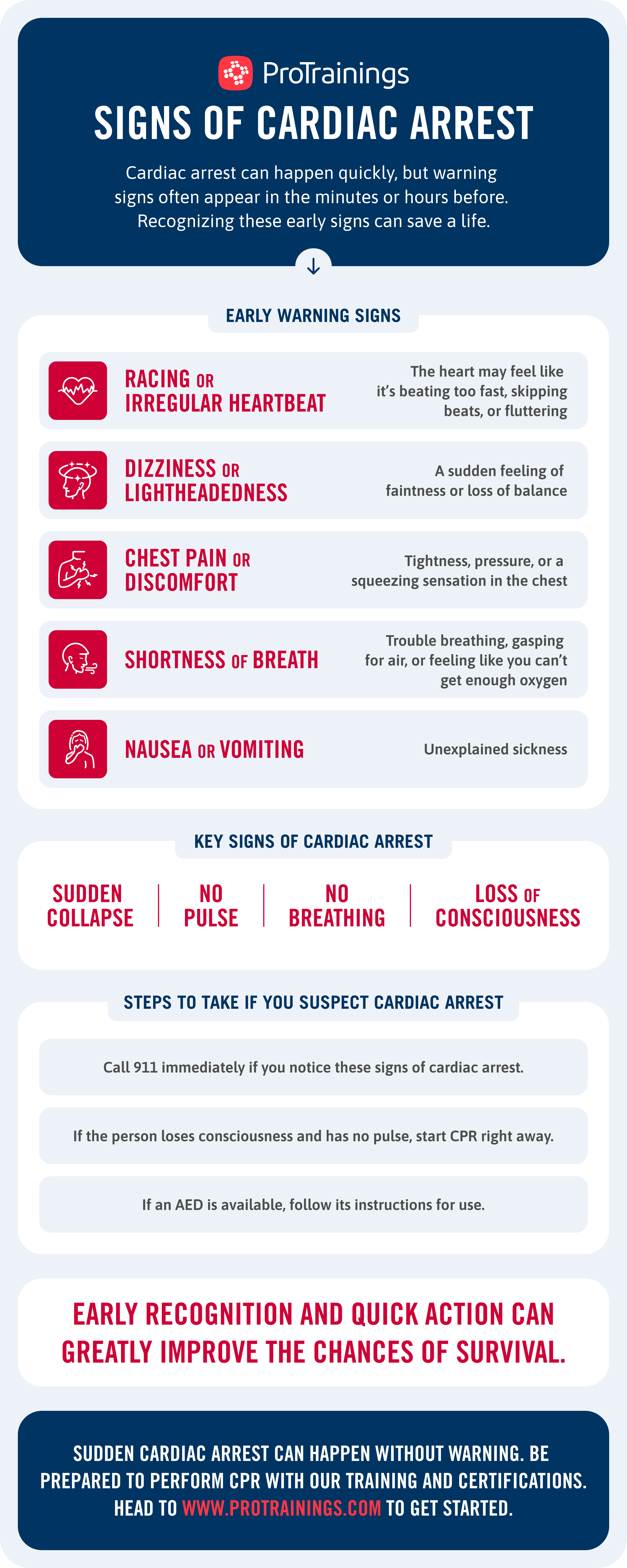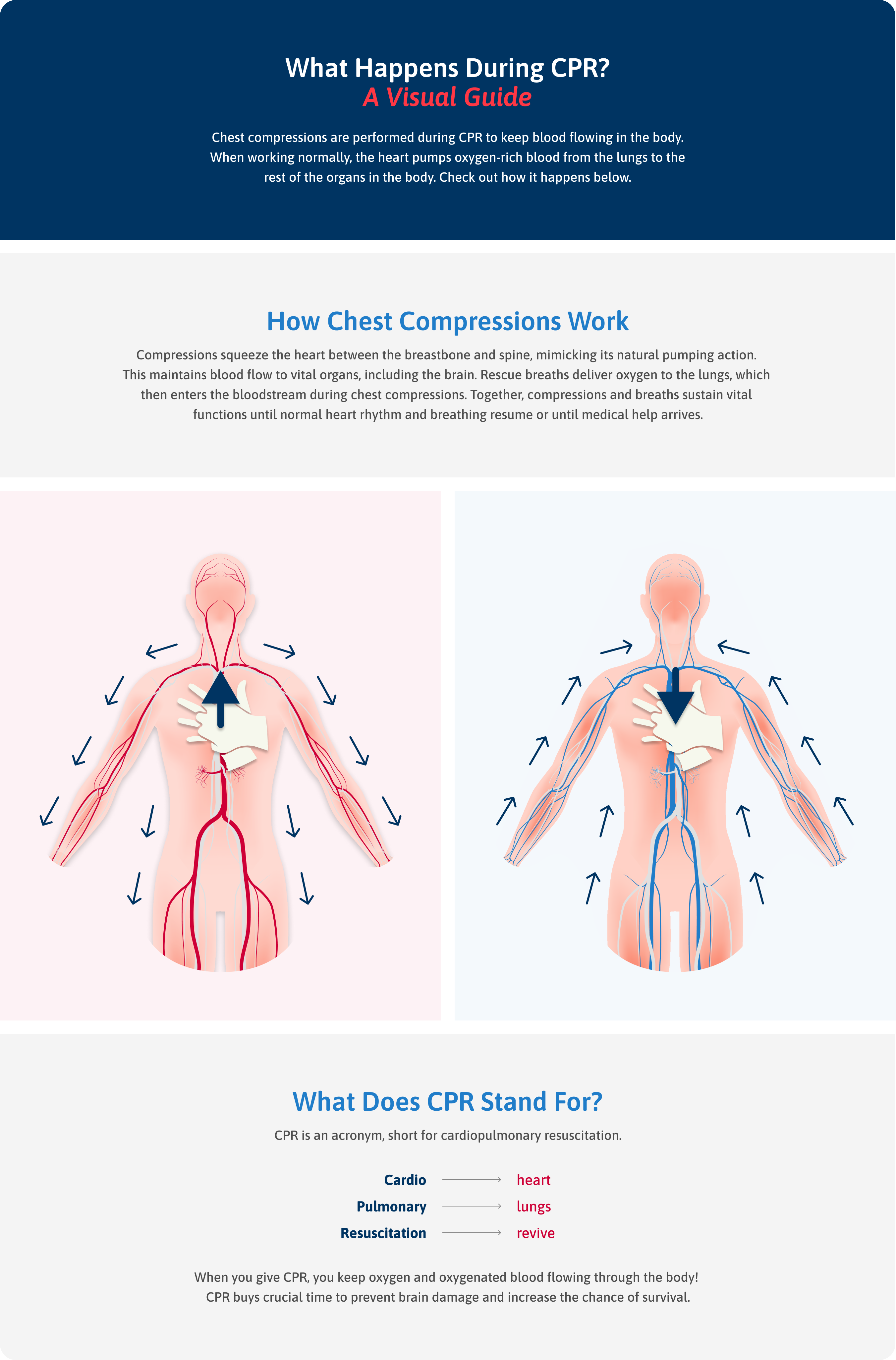Table of Contents
- What Happens in the Minutes Before Someone Needs CPR?
- What Happens in the First Minute of CPR?
- What Happens After Two Minutes of CPR?
- What Happens After Four Minutes of CPR?
- What Happens After Six Minutes of CPR?
- What Happens After 10 Minutes of CPR?
- What Happens During CPR: 20 Minutes and Counting
- Can You Survive If Your Heart Stops for 20 Minutes?
- Have People Survived After Receiving an Hour or More of CPR?
- CPR Survival FAQ
You’re out for a walk in the park when you notice someone lying on the ground, unresponsive. Their face is pale, and they’re not breathing. Panic surges through your chest, but you quickly remember your CPR training. You don’t have time to hesitate.
According to the American Heart Association (AHA), a person’s chances of surviving cardiac arrest decreases by 10% for every minute CPR is delayed. You immediately start chest compressions, knowing that with each pump, you’re circulating the last bit of oxygen in their body.
Your heart races as you move with purpose, and you know that every minute you wait to act could lower their chances of survival.
Each moment in the CPR process works hard to restore oxygen and blood flow throughout the body. From the first chest compression to the second minute, the body undergoes physical changes, and knowing what’s happening allows you to stay focused and continue the lifesaving effort.
Keep reading for a breakdown of what happens minute by minute during CPR and to learn how your quick actions can help give someone the best chance for recovery.
What Happens in the Minutes Before Someone Needs CPR?
The first sign of cardiac arrest is loss of consciousness. While loss of consciousness isn’t always caused by cardiac arrest, signs indicating that a cardiac arrest could be taking place in the moments before the victim loses consciousness include:
- A racing heartbeat
- Feeling dizzy or lightheaded
- Chest pain
- Shortness of breath
- Nausea or vomiting
These symptoms can occur in the hours or seconds before a victim experiences cardiac arrest. But what happens during CPR to reverse the ill effects of cardiac arrest? Below is a minute-by-minute rundown.

What Happens in the First Minute of CPR?
In the event of a cardiac arrest, blood isn’t circulating well enough to get oxygen to the organs. Without the oxygen and sugars the brain needs to function, it fails at delivering the signals required to keep the body’s organs working. Proper CPR administration helps circulate blood when the body is unable to do it on its own.

The first minute of CPR is crucial. For every minute the organs aren’t receiving oxygen, more of these organs’ cells start to die.
What Happens After Two Minutes of CPR?
If CPR is being performed correctly, blood should still be flowing through a person’s arteries and oxygen will be getting through to these vital organs.
It‘s best to begin CPR within the first two minutes of cardiac arrest. If CPR is delayed by longer than three minutes, victims begin to experience global cerebral ischemia, or insufficient blood flow to the brain.
What Happens After Four Minutes of CPR?
By now, without CPR, the victim has almost certainly been affected by global cerebral ischemia, which can lead to irreversible brain damage.
Of course, CPR can drastically alter this narrative. This is because the person performing CPR is manually pumping the victim’s heart, which is delivering blood around the body and feeding those vital organs their beloved oxygen.
If CPR is initiated within four minutes, the victim is less likely to have developed a serious brain injury by this point. Unfortunately, without CPR, even if the person is resuscitated at this time, the risk of brain injury is high.
What Happens After Six Minutes of CPR?
Six may be the magic number when it comes to cardiac arrest. The time of brain death after cardiac arrest has been widely researched, and the consensus is that without CPR, the brain can only survive for six short minutes following the point of cardiac arrest.
With CPR in the scenario, this turns into a possibility of brain damage. This could still be catastrophic for the victim, but the CPR provider has prevented total brain death in these six minutes.
What Happens After 10 Minutes of CPR?
After 10 minutes of cardiac arrest with no CPR, total brain death is the most likely outcome. Even with CPR, the chances of resuscitation and recovery are extremely low.
While the chances of survival after 10 minutes are low, with CPR they’re much higher than if the person hadn’t received CPR at all. The advice is to keep going until medical help arrives. You never know how a victim might respond to CPR when it’s given properly.
What Happens During CPR: 20 Minutes and Counting
In a study published by the Journal of the American Heart Association, victims (within certain parameters) who received CPR for 20 minutes faced a drop in survival rate to just 4.6%. Of these people, only 1.9% survived without a catastrophically injured brain.
That being said, CPR — even after 20 minutes — can still be beneficial. In fact, there have been several cases of successful resuscitation after the 20-minute mark.
Can You Survive If Your Heart Stops for 20 Minutes?
Surviving after the heart has stopped for 20 minutes is extremely rare, but under certain conditions, it’s possible. When the heart stops beating, blood circulation comes to a halt, cutting off the oxygen supply to the brain and other fundamental organs. Oxygen is essential for cellular function, and without it, the body begins to shut down rapidly.
Within 4 to 6 minutes, brain cells start to die due to oxygen deprivation.
After 10 minutes, the likelihood of irreversible brain damage increases significantly, often leading to severe neurological impairment or death. The longer the body goes without circulation, the more difficult recovery becomes, making the minutes after cardiac arrest crucial for survival.
Cardiac arrest often has poor outcomes when prolonged; however, some individuals have defied the odds due to a variety of circumstances. The body’s ability to tolerate oxygen deprivation varies from person to person, depending on factors such as overall health, underlying medical conditions, and the cause of cardiac arrest.
In some cases, external conditions may slow the body’s deterioration, delaying the onset of brain damage and increasing the chances of a successful resuscitation. Even in situations where the heart has stopped for an extended period, recovery may still be possible if certain factors work in the person’s favor.
Although most prolonged cardiac arrests have severe outcomes, some individuals have fully recovered. These rare cases highlight the body’s resilience, with survival often depending on immediate intervention, advanced medical techniques, pre-existing hypothermia, and individual health factors.
Immediate CPR & Defibrillation
Immediate CPR helps maintain minimal blood flow, delaying irreversible damage and increasing the chances of survival. Chest compressions manually pump the heart, keeping oxygenated blood moving until more advanced care is available.
An automated external defibrillator (AED) can further improve survival rates by delivering a controlled electric shock to reset the heart into an organized rhythm. AEDs are designed to be easy to use, providing step-by-step instructions so bystanders can take action quickly. The sooner an AED is used, the higher the likelihood of restoring a normal heartbeat.
CPR and defibrillation work together to buy time until emergency medical professionals arrive. Without these interventions, the survival rate decreases rapidly with each passing minute. Quick action, even by those without formal medical training, can make the difference between life and death.
Advanced Medical Techniques
When cardiac arrest occurs, immediate intervention is important, but advanced medical techniques can greatly improve survival rates and outcomes. These advanced interventions include the use of defibrillation, medications, and life support systems to support circulation and oxygenation until the heart can resume normal function.
Defibrillation is often the first step in advanced care, as it can restore a normal heart rhythm by delivering a controlled electric shock.
Medications like epinephrine and antiarrhythmic drugs are administered to help stimulate the heart or stabilize its rhythm, giving the victim the best chance of recovery.
A life support system called extracorporeal membrane oxygenation (ECMO) can temporarily take over the function of the heart and lungs, providing oxygen to the body and allowing the medical team to work on restoring natural heart function. While ECMO isn’t a new technology, it’s slowly becoming more accessible in out-of-hospital settings.
In these moments, rapid transport to a hospital is essential. The sooner the victim reaches a medical facility, the more likely they are to survive with fewer complications, especially if interventions such as ECMO or therapeutic hypothermia are needed.
These advanced medical techniques play a significant role, particularly when combined with immediate CPR and defibrillation.
Hypothermia
In rare and extreme cases, hypothermia can actually extend the time a person can survive cardiac arrest. When the body is exposed to cold temperatures, such as when someone falls into icy water, the body’s metabolic rate slows significantly.
This reduction in metabolism decreases the body’s need for oxygen, allowing the brain and other organs to function with less oxygen for a longer period. In situations like this, the body’s response to the cold environment can effectively “preserve” its systems, delaying the onset of damage that would normally occur with oxygen deprivation.
These cases are exceedingly rare, but they do emphasize the remarkable resilience of the human body in extreme conditions. In these instances, immediate medical intervention and rapid rewarming techniques are critical to restoring normal body function and preventing complications.
This phenomenon of survival through hypothermia offers valuable insights into how environmental factors can influence the outcome of cardiac arrest and why quick, specialized medical care is essential in these rare emergency situations.
Variable Survival Outcomes
Survival after cardiac arrest depends on several factors, including the speed and quality of intervention, the individual’s overall health, and the underlying cause of the cardiac arrest.
Starting CPR immediately can make a significant difference. The sooner chest compressions begin, the more oxygenated blood is kept circulating through the body, reducing the risk of severe brain damage.
However, without immediate CPR or medical intervention, surviving 20 minutes of cardiac arrest without severe brain damage is highly unlikely. The longer the heart remains stopped, the more difficult it becomes to avoid irreversible harm to the brain and other organs.
As mentioned, survival after 20 minutes of cardiac arrest is rare, yet not impossible under specific conditions when prompt action and advanced medical care are involved. Immediate CPR and access to an AED can increase survival chances dramatically.
This underscores the importance of widespread CPR training and the availability of AEDs in public spaces. Timely intervention can save lives, making it essential for bystanders to act quickly and for communities to be prepared to respond in emergency situations.
Have People Survived After Receiving an Hour or More of CPR?
It’s incredibly rare for a victim to survive after an hour or more of CPR. However, there are, of course, some exceptions. These medical marvels appear to defy all odds and make full recoveries after receiving CPR for sometimes hours at a time.
A study in 2019 raised the case of a 52-year-old Italian mountaineer who had survived cardiac arrest with complete organ recovery after receiving CPR for 5 hours and 44 minutes. Similarly, 29-year-old John Letterman from North Carolina survived after 210 minutes, over three hours, of CPR, as reported by the Sudden Cardiac Arrest Foundation.
While these stories are inspiring, they are outliers and shouldn’t be considered typical outcomes. A 2018 review by the Scandinavian Journal of Trauma, Resuscitation and Emergency Medicine pointed out gaps in understanding the factors that contribute to brain damage in cardiac arrest cases, calling for more research into these complex scenarios.
The possibility of survival, especially after prolonged cardiac arrest, depends on several factors, including the timing and quality of intervention, as well as the circumstances of the arrest. Rapid intervention, including performing CPR immediately, can significantly improve the chances of survival in emergencies.
Being prepared means learning CPR, recognizing cardiac arrest signs, and knowing how to respond.
To be ready to make a lifesaving difference during a cardiac emergency, we encourage you to take ProTrainings’ CPR, first aid, and AED training courses. Gaining these skills will not only help you respond in emergencies but could also give someone the best chance at survival.
Follow us on LinkedIn to find out more essential information about the timelines of CPR.
CPR Survival FAQ
Cardiac arrest requires immediate lifesaving interventions, and there are many questions about how survival is possible after the heart stops beating for an extended period. Factors like the timing of intervention, the use of advanced medical care, and the person’s overall health are all influential.
Here are some of the most common questions related to survival after prolonged cardiac arrest and more information about how fast response times and advanced medical techniques can impact outcomes.
- Can advanced medical interventions restart the heart after 20 minutes?
In some cases, advanced medical interventions such as defibrillation, medications, and life support systems can help restart the heart even after 20 minutes of cardiac arrest. While survival is possible with prompt intervention, the chances of recovery decrease the longer the heart remains stopped. - What role does an AED play in survival?
An AED can restore a normal heart rhythm by delivering a controlled shock. When used immediately after cardiac arrest, it greatly increases survival chances and helps prevent brain damage, especially when combined with CPR. - Can someone fully recover after their heart stops for an extended period?
While full recovery is rare, it’s possible with immediate CPR and advanced medical care. Factors such as how quickly CPR is administered, whether defibrillation occurs early, and the person’s overall health contribute to the likelihood of healing. - How do emergency responders handle cases where the heart has stopped for 20 minutes?
Emergency responders follow established protocols to attempt stabilization of the victim, including performing high-quality CPR, providing defibrillation, using advanced airway procedures, and administering medications. They may also use life support systems, like ECMO, to help oxygenate the blood and keep the victim alive until they can be transported to the hospital. - How does the underlying cause of cardiac arrest affect survival?
The cause of the cardiac arrest impacts survival chances. For example, an arrest caused by arrhythmia may be reversed with defibrillation, while one caused by respiratory failure may require additional focus on breathing and respiratory medications such as albuterol or naloxone.
Survival outcomes after cardiac arrest vary based on multiple factors, such as the speed of response, the individual’s health, and the cause of the arrest. Immediate action and access to medical care are key to improving the likelihood of a positive result.
